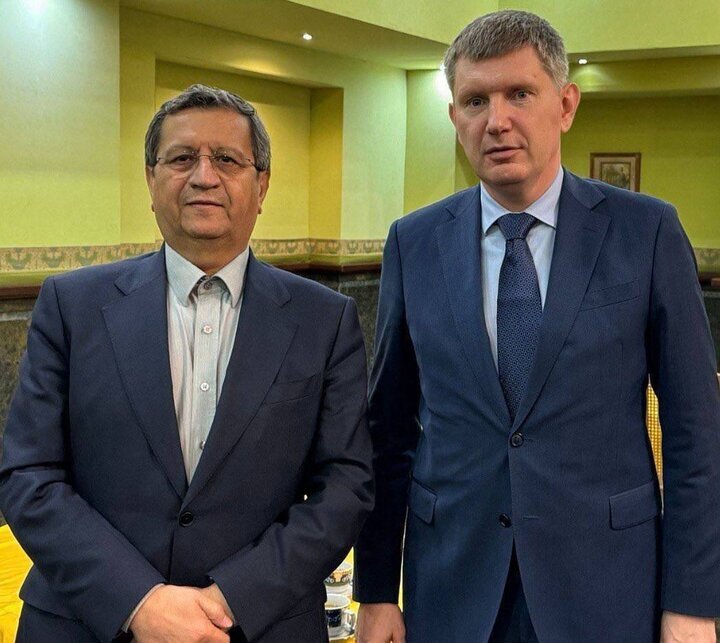Tehran, Moscow call for strengthening economic ties

TEHRAN - Iran's Minister of Finance and Economic Affairs Abdolnasser Hemmati and Russia's Minister of Economic Development Maxim Reshetnikov have called for strengthening economic ties between the two countries.
Hemmati met and held talks with Reshetnikov on the sideline of the talks between high-ranking delegations of Iran and Russia on Monday evening, IRNA reported.
Referring to the increasing trade between Iran and the member countries of the Eurasian Economic Union, Reshetnikov expressed hope that this process will accelerate further.
During the meeting, the two sides discussed customs issues, Russian investments in the oil industry, the progress of the Rasht-Astara railway, the North-South Corridor, truckers' insurance, trade currency settlement, strengthening the Eurasian Economic Union, and other economic issues between the two countries.
Iranian President Masoud Pezeshkian said on Monday that an agreement to transform Iran into a regional transit and gas hub is a prime example of cooperation between Tehran and Moscow.
“We believe that if important joint projects between Iran and Russia are implemented, they will create significant capacities for both countries to counter cruel sanctions,” Pezeshkian said during a meeting with visiting Russian Prime Minister Mikhail Mishustin.
The president underscored that the Iran-Russia partnership not only serves the interests of both nations but will also promote sustainable development, economic growth and integration in the region.
Pezeshkian called for efforts from both sides to ensure the successful execution of the joint projects.
He pointed out that regional cooperation through international organizations like BRICS and the Shanghai Cooperation Organization (SCO) strengthens independent countries, including Iran, Russia, and China, in their efforts to resist US unilateralism.
The Iranian president also noted that the escalating aggression by the Israeli regime, with direct support from the United States, poses a collective threat to the interests of regional nations, necessitating greater collaboration to counter such schemes.
In response, the Russian prime minister reiterated Russia’s desire to enhance and expand interactions with Iran, particularly in energy, industry, transportation, agriculture, healthcare, and cultural sectors.
In early July, Governor of the Central Bank of Iran (CBI) Mohammadreza Farzin said a monetary contract has been signed between Tehran and Moscow for carrying out bilateral trade exchanges.
Farzin told reporters that he and his Russian counterpart had a meeting in Saint Petersburg where they finalized agreements already signed between the two countries.
During the meeting, the chief bankers of Iran and Russia also signed a memorandum of understanding (MOU) on joint measures to be taken by the two countries for the expansion of economic and monetary ties.
According to Farzin the new monetary contract enables Iran and Russia to trade in local currencies.
He added that based on agreements between the specialized delegations of the two countries, Iran’s Shetab banking system will link Russia’s MIR interbank system by the end of August.
The official said that the new scheme would allow Iranian nationals to take ruble from Russian ATMs using their Iranian banking cards.
"During the meeting, the two sides finalized the requirements to connect Russia’s Mir payment system to Iran’s Shetab and this project has entered the operational phase," Farzin said.
He added that the scheme will further develop in the next phases to allow Russian nationals to use their banking cards in Iranian ATMs and will then enable using Iranian cards at the Russian poses.
"The second stage [involves the possibility of] paying with Russian citizens’ cards in Iran," Farzin said, adding that in the third stage, Iranians will be able to pay with a Shetab card in Russian stores via an ordinary bank terminal.
In April 2024, the Iranian Foreign Ministry announced that the project to use Mir cards had entered the implementation stage. In May 2022, Russian Deputy Prime Minister Alexander Novak said that the countries were discussing how to connect the Mir and Shetab payment systems.
As reported by the Islamic Republic of Iran Customs Administration (IRICA), the value of non-oil trade between Iran and Russia stood at $968.772 million in the first five months of the current Iranian calendar year (March 20-August 21).
The IRICA report put the weight of the non-oil trade between the two countries at 2.09 million tons.
As reported Iran-Russia five-month non-oil trade indicates 19 percent fall in value and 15 percent drop in weight, year on year.
Russia was the fifth top trade partner of Iran among the Islamic Republic’s neighbors in the first five months of the present year.
EF/MA
Photo: Iran's Economy Minister Abdolnasser Hemmati (L) and Russia's Minister of Economic Development Maxim Reshetnikov

Leave a Comment